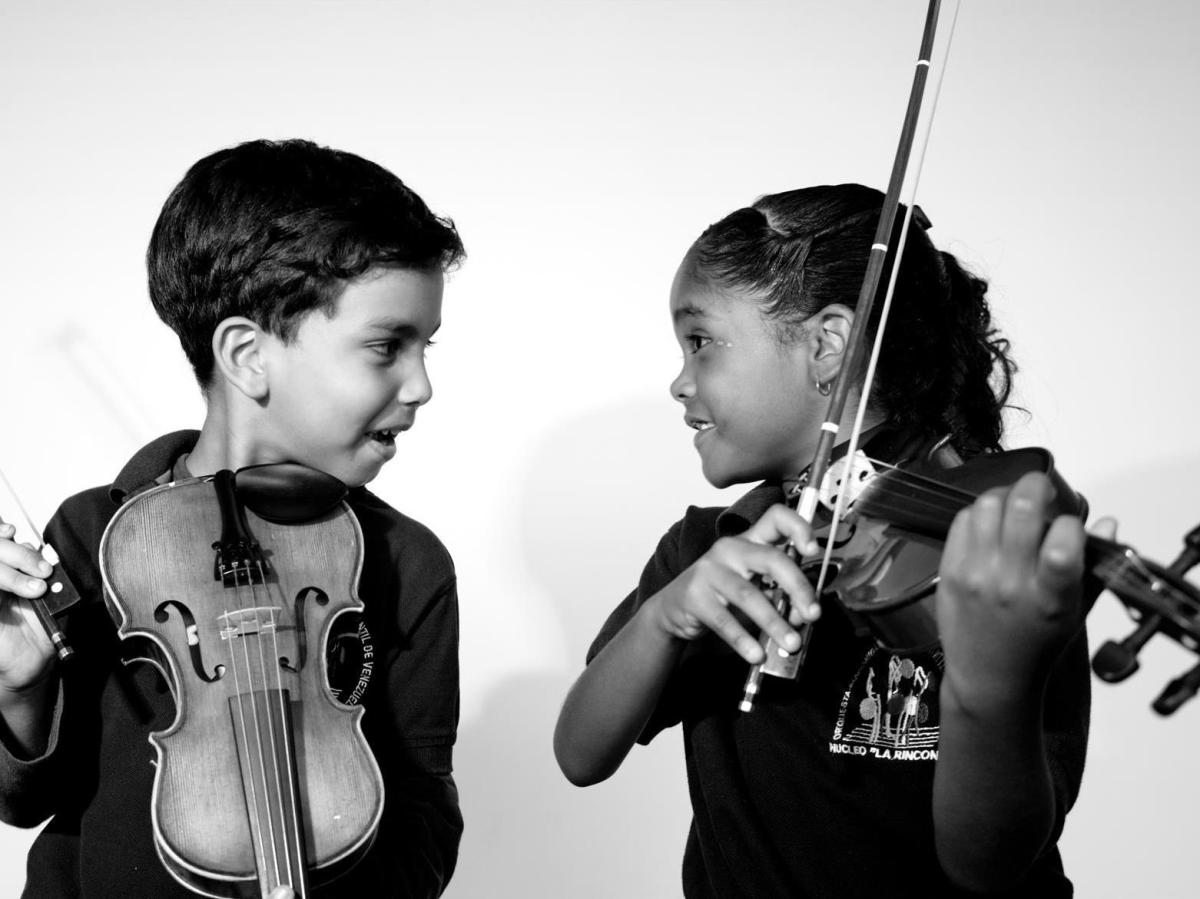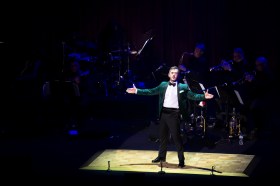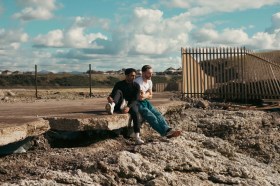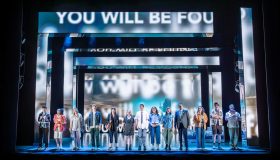Image: An exhibition paying homage to the achievements of El Sistema in Venezuela was shown by Leica at the Salzberg Festival in 2013.
‘Poverty is not just a lack of a roof or bread. It is also a spiritual lack—a loneliness and lack of recognition. The vicious cycle of poverty can be broken when a child poor in material possessions acquires spiritual wealth through music.’
These are the words of José Antonio Abreu, the inspirational conductor who founded El Sistema, a free music education program for impoverished children.
Forty years after the program began in the slums of Venezuela, there are now more than a million young people around the world participating in El Sistema programs.
‘There are programs in Afghanistan, Palestine, and refugee camps in Europe; in slums of Manila, Rio and Nairobi; in a Maori community of New Zealand, and an Inuit community of Greenland. Wealthy cities like Los Angeles, New York, Paris, London, Stockholm, Vienna, and Hong Kong even have programs for children living in poverty. There are over 130 different programs in the US alone. Though the research is still scarce, it affirms the enthusiastic claims—intensive ensemble learning in the arts can, and does change the trajectory of kids’ lives.now involves 800,000 young people in this poor country—more youth than in organised sports. The program has spread to 65 countries,’ writes US music educator Eric Booth, who together with Tricia Tunstall has published Playing for Their Lives: The Global El Sistema Movement for Social Change Through Music.
In researching the book the pair travelled to 100 programs in 25 countries. They found the young people who typically spend 20 hours a week in rehearsals produced remarkable musical accomplishments, and hundreds of excellent youth orchestras. But that was least of the achievement.
‘The goal of El Sistema is to transform the lives of young musicians, to disrupt entrenched cycles of poverty, by developing their confidence and learning along with their talent. Based on all the glowing reports I had heard, I expected El Sistema to be interesting but overhyped. Instead, I found the most extraordinary accomplishment in arts learning and in youth development I have ever seen.’
Uummannaq, Greenland
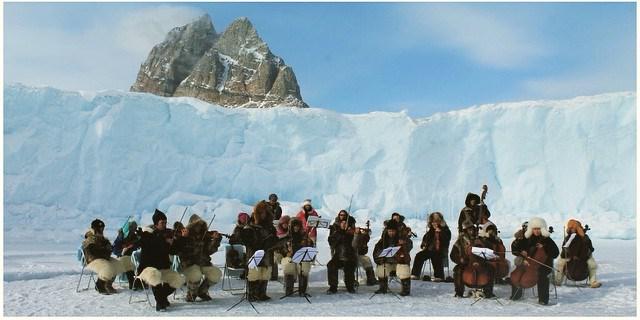
The 1,280 inhabitants of the Greenland town of Uummanaq live with months of darkness and are struggling to survive in the face of global warming. But their El Sistema orchestra gets to play on the world’s northernmost music platform on sea ice.
Image:Uummanaq Polar Institute.
East Durham, United States

Racial tensions are high in East Durham, North Carolina where an El Sistema program called MusicalMinds links with a local primary school to identify and help at risk students. Blythe Elementary teachers recommend students who have lost a parent or come from single parent homes, are struggling academically, have social and/or emotional behavioral issues, or are from low-income homes.
Image:MusicalMinds
Roma communities in Europe
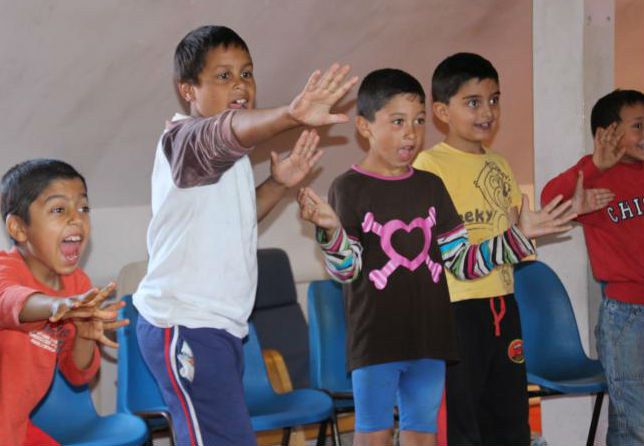
A European Union report in 2014 identified that Roma children suffer discrimination and poverty. Many are forced into sub-standard segregated education. At least 10% of those in aged 7 to 15 in Greece, Romania, Bulgaria, France and Italy do not go to school at all. El Sistema programs harness the strong musical tradition of the Roma to provide links with the education system.
Image: Eric Booth
Armenia
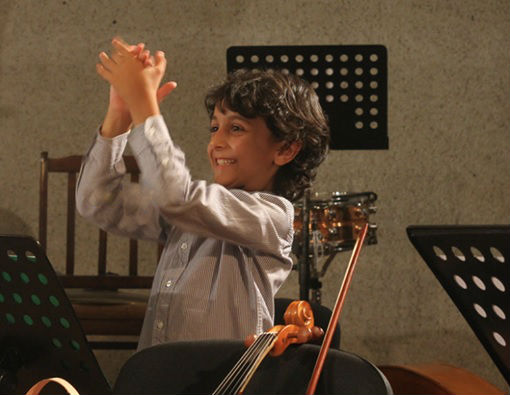
Almost a third of Armenians live in poverty according to the World Bank. Sistema Armenia provides a school choir program, orchestras and a music festival aimed at bringing social change and awareness. ‘The kids start to realise that everything I do matters, everything I do affects the person next to me and everything they do affects me and that is the power of the orchestra and that is what can change people’s minds…that starts to translate into other areas of life,’ said Artistic Director David Malek.
Image: Sistema Armenia
The Phillipines

Ang Misyon: Sistema for the Filipino Youth provides free music tuition to 120 young musicians from underprivileged communities in Metro Manila and Rizal, Aurora, Batangas, Cavite, Cebu and Samar provinces. In the highly divided Phillipines society, the And Misyon kids organises house-to-house soirees at posh subdivisions to raise funds for tuition. The program takes talented musicians involved in local ensembles and gives them the skills they need to reach a higher level and even make international careers in music.
Image: Ang Misyon
Istanbul, Turkey

Music for Peace, the El Sistema program in Turkey, provides social and cultural spaces for thousands of underprivileged children in Edirnekapı-İstanbul, eliminating obstructions to the right to access to arts. The program has won a number of changemaker awards including the 2009 Deutsche Bank Urban Age Award, which cited the success and sustainability of the system, and it presenting a positive model for the world.
Image: Music for Peace
England

Peer to peer education in an important part of all Sistema programs. In England 3,300 students from more than 80 schools participate in Sistema programs. A recent survey of headteachers found they had observed students involved in the program had improved Tsocial skills, perseverance, discipline, emotional and communication skills
Image: Sistema England
Australia

Crashendo! the Laverton Music Project in the Melbourne western suburbs is the first El Sistema program in Australia. Laverton resident Sharon Radau from Victoria Police initiated the program after seeing a documentary about the Venezuela experience.
‘These children come from an area where they may not necessarily have access to opportunities that other people have. They also come from various backgrounds of disadvantage where they might be from families with high opportunities or they come from overseas so they have got to face the issues of people coming to a new country. I saw the program through a documentary of it happening in Venezuela and I managed to find (director) Chris Nicholls and he was looking for a place to trial it in Australia so I said please come down and trial it in Laverton for us and he agreed,’ she said.
Image: Crashendo!
